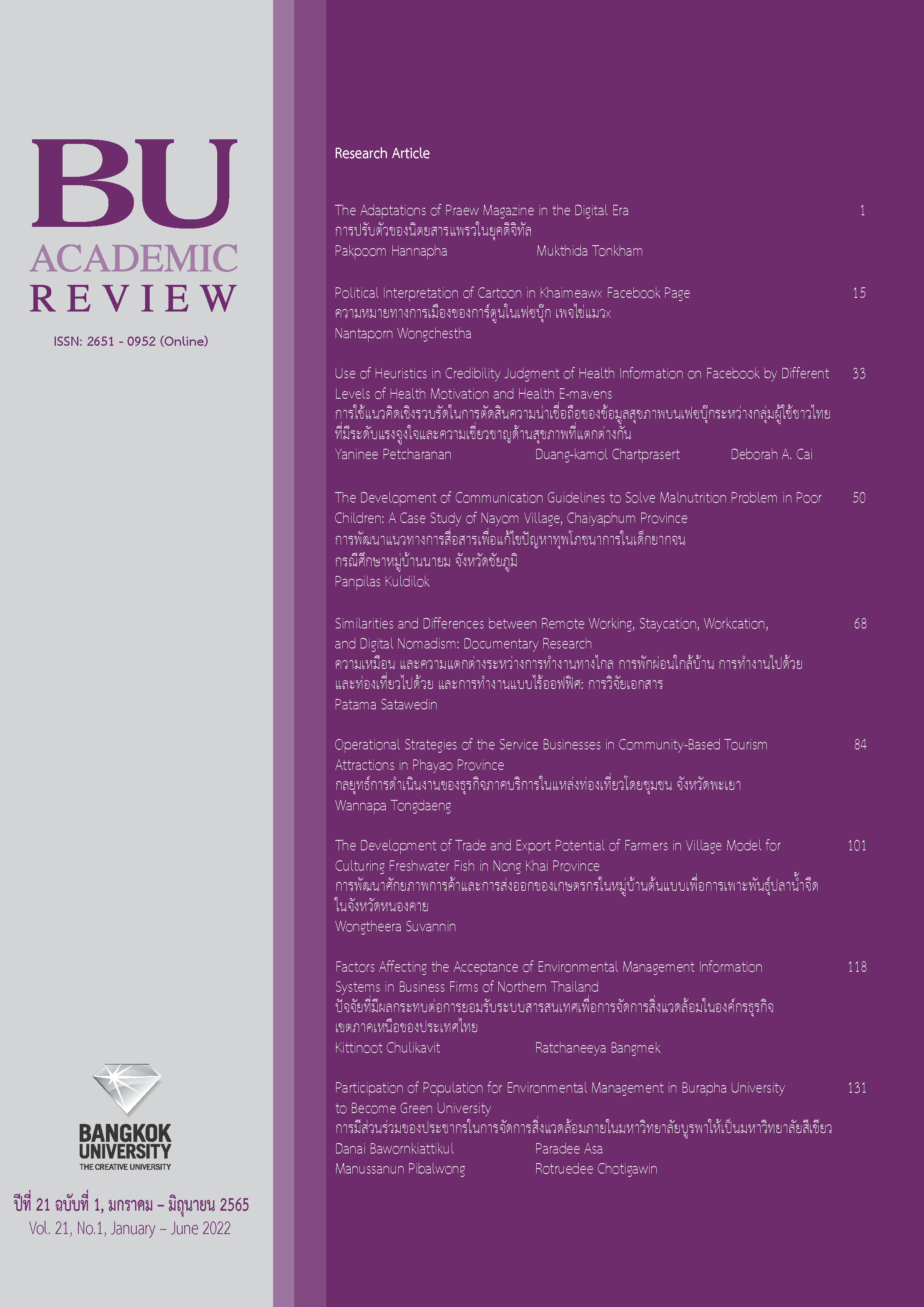กลยุทธ์การดำเนินงานของธุรกิจภาคบริการในแหล่งท่องเที่ยว โดยชุมชน จังหวัดพะเยา
Main Article Content
บทคัดย่อ
การศึกษานี้เป็นการวิจัยเชิงคุณภาพที่มีวัตถุประสงค์เพื่อศึกษาสถานการณ์การดำเนินธุรกิจภาคบริการ และเพื่อวิเคราะห์กลยุทธ์การดำเนินธุรกิจในแหล่งท่องเที่ยวโดยชุมชน จังหวัดพะเยา ระหว่างเดือนกุมภาพันธ์ 2563 ถึง เดือนมีนาคม 2564 เก็บรวบรวมข้อมูลโดยใช้การสัมภาษณ์เชิงลึกและการสนทนากลุ่มกับผู้มีส่วนได้ส่วนเสียในการพัฒนาการท่องเที่ยวโดยชุมชน ซึ่งได้จากการสุ่มตัวอย่างแบบเฉพาะเจาะจง จำนวน 36 ราย แล้วจึงดำเนินการวิเคราะห์เชิงเนื้อหา โดยอาศัยการวิเคราะห์สวอต และปรากฏผลการศึกษาว่า (1) จุดแข็ง ได้แก่ ประสบการณ์ของผู้ประกอบการ ความร่วมมือของกลุ่มธุรกิจ และการมีทิศทางการขับเคลื่อนธุรกิจ (2) จุดอ่อน ได้แก่ ความสามารถในการเข้าถึงทุน มาตรฐานการให้บริการ ข้อมูลข่าวสารไม่สมบูรณ์ และระบบการจัดการไม่มีประสิทธิภาพ (3) โอกาส ได้แก่ ความก้าวหน้าทางเทคโนโลยี ความโดดเด่นของแหล่งท่องเที่ยว ความพร้อมด้านโครงสร้างพื้นฐาน การสนับสนุนจากหน่วยงานที่เกี่ยวข้อง และแนวโน้มการเติบโตของอุตสาหกรรมการท่องเที่ยว และ (4) ภัยคุกคาม ได้แก่ การแข่งขันทางการตลาดสูง สภาวะเศรษฐกิจตกต่ำ ภัยคุกคามทางไซเบอร์ การดำเนินงานภาครัฐที่ยุ่งยากซับซ้อน การรับรู้ทางสังคมที่มีต่อการท่องเที่ยวโดยชุมชนคลาดเคลื่อน การแพร่ระบาดโควิด-19 และภัยพิบัติทางธรรมชาติ หลังจากนั้นจึงนำข้อมูลสถานการณ์ที่ได้จากการวิเคราะห์สวอตเข้าสู่ขั้นตอนของการกำหนดกลยุทธ์ 4 ประเภท ได้แก่ กลยุทธ์เชิงรุก กลยุทธ์เชิงป้องกัน กลยุทธ์เชิงแก้ไข และกลยุทธ์เชิงรับ
Article Details

อนุญาตภายใต้เงื่อนไข Creative Commons Attribution-NonCommercial-NoDerivatives 4.0 International License.
บทความที่นำมาสมัครลงตีพิมพ์ในวารสารต้องไม่เคยได้รับการตีพิมพ์เผยแพร่มาก่อน และไม่ส่งต้นฉบับบทความซ้ำซ้อนกับวารสารอื่น รวมทั้งผู้เขียนบทความต้องไม่ละเมิดหรือคัดลอกผลงานของผู้อื่น
เอกสารอ้างอิง
Boonchuai, J. & Dhamabutra, P. (2019). Phǣn yutthasāt phư̄a phatthanākān thō̜ngthīeo chœ̄ng sukkhaphāp bǣp būranākān yāng yangyư̄n nai Krung Thēp Mahā Nakhō̜n prathēt Thai [Strategic plan for integrated sustainable health tourism development in Bangkok, Thailand]. Humanities, Social Sciences and Arts, 12(1), 68-84.
Büyüközkan, G., Mukul, E., & Kongar, E. (2021). Health tourism strategy selection via SWOT analysis and integrated hesitant fuzzy linguistic AHP-MABAC approach. Socio-Economic Planning Sciences, 74, 100929.
Humphrey, A. (1960). The SWOT analysis method. Mento Park, CA: Stanford Research Institute.
Kelfaoui, A., Rezzaz, A., & Kherrour, L. (2021). Revitalization of mountain rural tourism as a tool for sustainable local development in Kabylie (Algeria). The case of Yakouren municipality. GeoJournal of Tourism and Geosites, 34(1), 112-125.
Kulakoglu-Dilek, N., Kizilirmak, I., & Dilek, S. E. (2018). Virtual reality of just reality? A SWOT analysis of the tourism industry. Journal of Tourismology, 4(1) 67-74.
Ministry of Tourism and Sports. (2020). Sathiti nakthō̜ngthīeo phāinai prathēt pī (čhamnǣk tām phūmiphāk læ čhangwat ) : sathiti nakthō̜ngthīeo phāinai prathēt Q - Q pī ( prathēt ) [Domestic tourism statistics Q1-Q4 (Classify by region and province)]. Retrieved Apirl 29, 2020, from https://www.mots.go.th/more_news_new.php?cid=618
Namugenyi, C., Nimmagadda, S. L., & Reiners, T. (2019). Design of a SWOT analysis model and its evaluation in diverse digital business ecosystem contexts. Procedia Computer Science, 159, 1145-1154.
National News Bureau of Thailand. (2018). Botkhwām: Nayōbāi phlak dan nakthō̜ngthīeo dœ̄nthāng čhāk mư̄ang lak sū mư̄ang rō̜ng [Tourism policy: Connecting the major cities and distributing income to minor citites]. Retrieved Apirl 29, 2020, from https://thainews.prd.go.th/th/news/print_news/WNRPT6109100010001
Office of Phayao Province. (2018). Phǣn phatthanā čhangwat Phayao ( Phō̜.Sō̜. sō̜ngphanhārō̜ihoksipʻet sō̜ngphanhārō̜ihoksiphā ) chabap thopthūan pračham pī Phō̜.Sō̜. sō̜ngphanhārō̜ihoksipsam [Phayao provincial development plan (2018 - 2022): Annual review edition 2020]. Retrieved Apirl 29, 2020, from http://www.oic.go.th/FILEWEB/CABINFOCENTER66/DRAWER028/GENERAL/DATA0000/00000715.PDF
Office of the Permanent Secretary of Ministry of Tourism and Sports. (2017). Rāingān chabap sombūn ( Final Report ) khrōngkān čhat phǣn patibatkān khapkhlư̄an kānphatthanā thō̜ngthīeo dōi chumchon yāng yangyư̄n læ sāngsan [Final report: Making an action plan to drive sustainably and creatively community-based tourism]. Retrieved Apirl 29, 2020, from https://secretary.mots.go.th/ewtadmin/ewt/secretary/download/PDF/12_App2_Data_CBTDec2017_North_84.pdf
Özgeriş, M., & Karahan, F. (2021). Use of geopark resource values for a sustainable tourism: A case
study from Turkey (Cittaslow Uzundere). Environment, Development and Sustainability, 23, 4270-4284.
Sertsri, S., & Buasorn, P. (2017). Nǣothāng kānčhatkān thō̜ngthīeo yāng yangyư̄n nai chumchon khlō̜ng
khōn ʻAmphœ̄ Mư̄ang čhangwat Samut Songkhrām [Sustainable tourism management in Klongkone community, Mueng district, Samutsongkhram province]. The Journal of Faculty of Applied Arts, 10(2), 109-117.
Tourism Authority of Thailand. (2018). TAT review: Kānthō̜ngthīeo dōi chumchon withī Thai kēkai yāng yangyư̄n [Review of the issue of promoting community-based tourism (Community Based Tourism). Retrieved Apirl 29, 2020, from https://secretary.mots.go.th/ewtadmin/ewt/ga/download/article/article_20200416204840.pdf
Weihrich, H. (1982). The TOWS matrix—A tool for situational analysis. Long Range Planning, 15(2),
-66.


